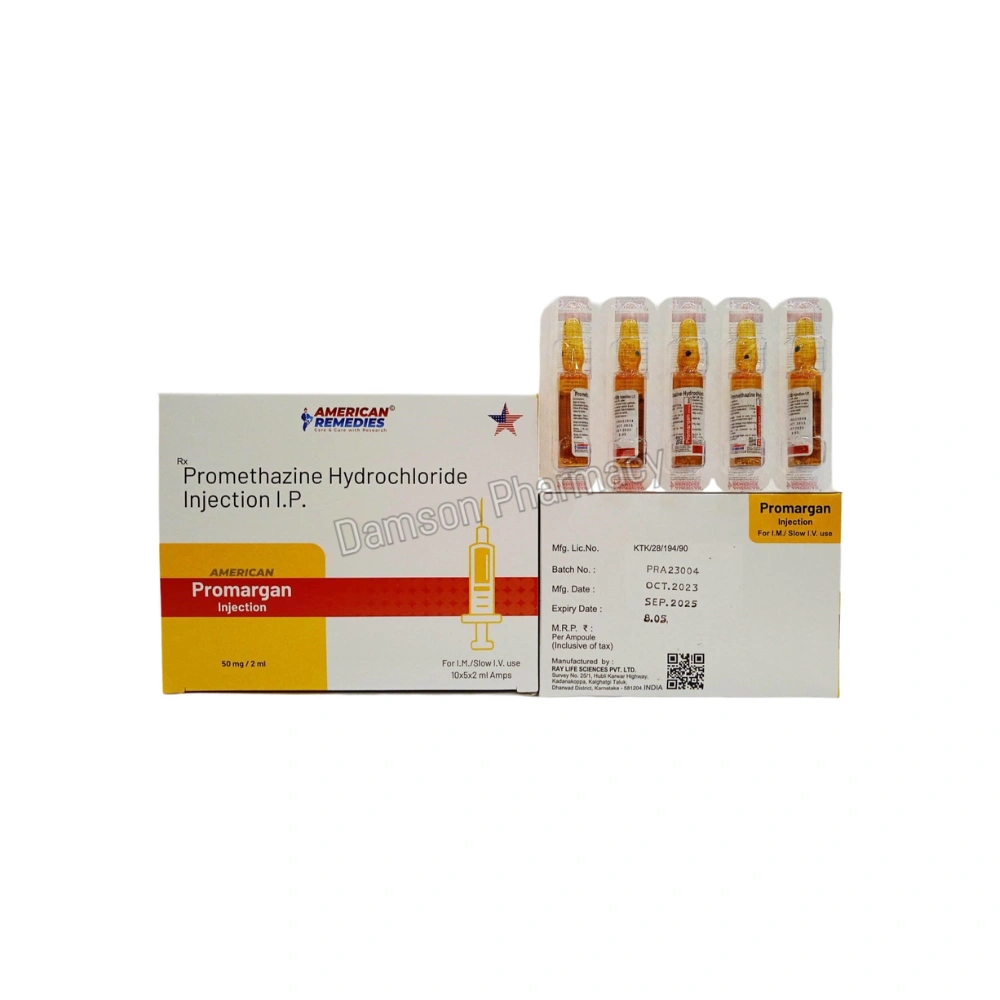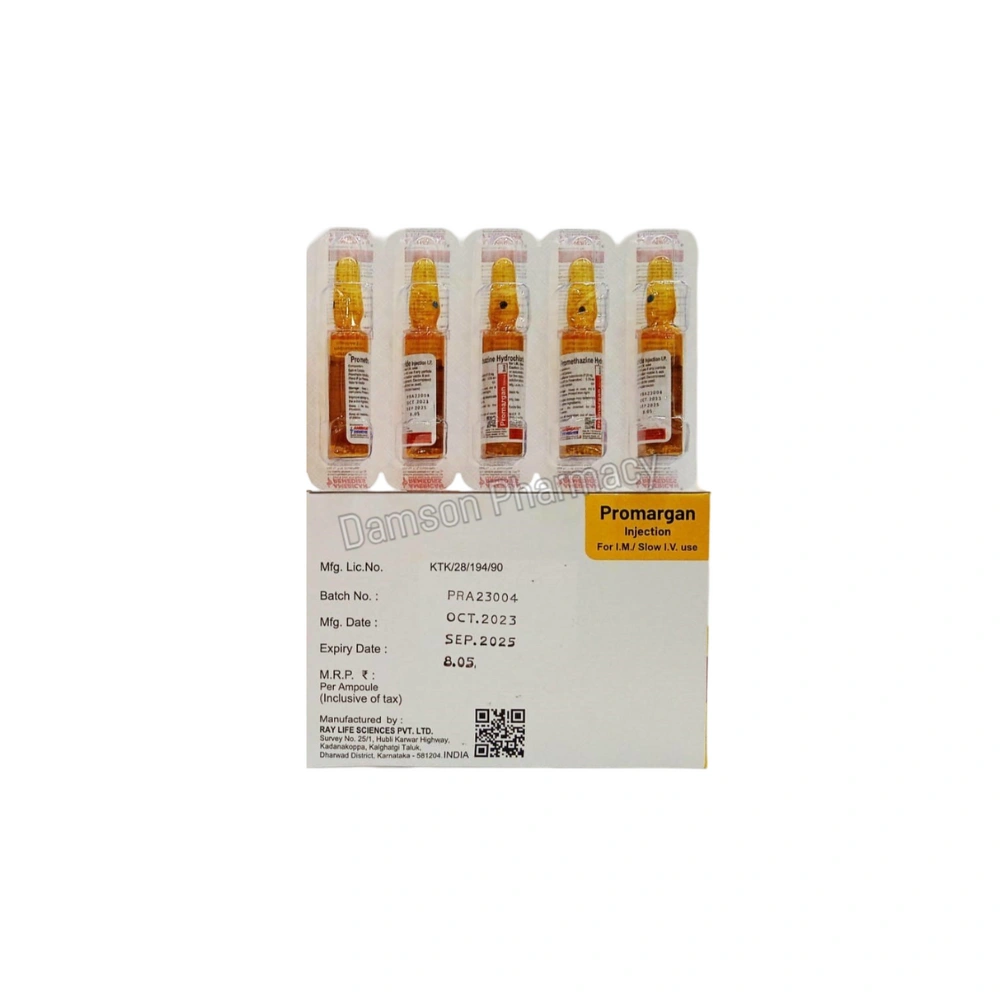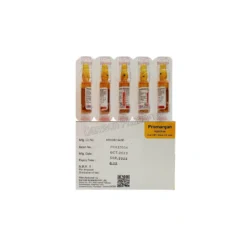Promargan Injection Promethazine Hydrochloride
$204.00 – $360.00Price range: $204.00 through $360.00
| Pack Size | Price | Price / Unit | Quantity | |
|---|---|---|---|---|
| 12 Injections | $204.00 | $17.00/ unit | ||
| 24 Injections | $336.00 | $14.00/ unit | ||
| 36 Injections | $360.00 | $10.00/ unit |
Looking for bulk / B2B pricing? | Send Inquiry |

| SKU | 11417 |
| Manufacturer | American Remedies Healthcare Pvt. Ltd |
| Categories | Allergies |
| Delivery Time | 10 - 14 Working Days |
| Strength | 50mg/2ml |
Introduction to Promargan Injection
Promargan Injection is a pharmaceutical formulation primarily containing promethazine, an antihistamine used to treat a variety of conditions such as allergies, motion sickness, nausea, and vomiting. It is also commonly prescribed as a sedative or sleep aid before surgery due to its calming effects.
Administered through intramuscular or intravenous injection, Promargan offers a faster onset of action compared to oral forms, making it effective for urgent medical needs. This medication works by blocking histamine, a substance in the body that causes allergic symptoms, and it also affects certain chemicals in the brain, which helps control nausea and induce sedation.
Its multi-functional nature makes it a valuable tool in emergency and clinical settings, especially when oral administration isn’t possible or when rapid symptom relief is required. Overall, Promargan Injection is a versatile and fast-acting medication useful in various therapeutic contexts.
Uses of Promargan Injection
Promargan Promethazine Injection is used for various medical purposes, primarily due to its antiemetic (anti-nausea), antihistaminic, and sedative properties. Here are some common uses of Promargan Promethazine Injection:
- Allergy Relief
- Prevention and Treatment of Nausea and Vomiting
- Sedation
- Sleep Aid
- Adjunct in Pain Management
How Does Promargan Injection Works?
Promargan Injection works by blocking histamine H1 receptors in the body. Histamine is a chemical involved in allergic reactions, and by preventing it from binding to its receptors, Promargan helps reduce symptoms like itching, swelling, and runny nose. This antihistamine action makes it effective in treating allergies and allergic reactions.
In addition to its antihistamine effects, Promargan also acts on the brain’s central nervous system by blocking dopamine receptors. This action helps control nausea, vomiting, and motion sickness. Its sedative properties also come from its ability to depress certain brain functions, making it useful as a calming agent or sleep aid before surgery.
Side Effects of Promethazine
Common Side Effects
- Sedation
- Dizziness or Lightheadedness
- Dry Mouth
- Injection Site Reactions
- Blurred Vision or Confusion
Serious Side Effects
- Severe Allergic Reactions
- Respiratory Depression
- Severe Tissue Damage
- Seizures or Muscle Stiffness
- Heart Rhythm Problems
Dosage of Promargan Injection
The dosage of Promargan Injection varies depending on the patient’s age, medical condition, and reason for use, but it is typically administered in doses ranging from 12.5 mg to 50 mg by intramuscular (IM) or intravenous (IV) injection.
For adults, 25 mg is commonly used for allergy relief or nausea, while 50 mg may be given for sedation. In children, lower doses are carefully calculated based on weight. All dosages should be determined and administered by a healthcare professional to ensure safety and effectiveness.
How To Manage Side Effects?
- Stay hydrated
- Avoid driving
- Change positions slowly
- Apply cold pack
- Limit alcohol
- Monitor breathing
- Report severe symptoms immediately
- Use medication exactly as prescribed
Warnings & Precautions
Promargan Promethazine Injection has specific warnings and precautions that individuals and healthcare professionals should be aware of to ensure safe and effective use. It’s important to discuss any concerns or medical history with a healthcare provider before starting Promargan Promethazine Injection. Here are important warnings and precautions associated with Promethazine injection:
1. Drowsiness
-
Promargan can make you feel very sleepy. Don’t drive or use machines after getting the injection.
2. Breathing Problems
-
It can slow down breathing, especially in children or people with asthma. Tell your doctor if you have breathing issues.
3. Children Under 2 Years
-
It should not be used in babies or toddlers under 2 years old — it can be dangerous.
4. Heart Issues
-
If you have heart problems, this medicine might affect your heart rhythm. Tell your doctor.
5. Liver or Kidney Problems
-
It might affect people with liver or kidney disease differently — your doctor might need to adjust the dose.
6. Mental Alertness
-
You might feel confused or restless, especially if you’re older. Let your doctor know if this happens.
7. Pregnancy & Breastfeeding
-
Tell your doctor if you are pregnant or breastfeeding — they’ll decide if it’s safe for you.
Storage
- Store Promargan Injection at a controlled room temperature between 20°C to 25°C (68°F to 77°F).
- Keep the injection away from direct light and moisture, as exposure can reduce its effectiveness.
- Do not freeze the medication; if it freezes, discard it immediately.
- Keep Promargan Injection in its original packaging until ready for use to protect it from light and contamination.
- Do not use if the solution appears discolored, cloudy, or contains particles.
- Always check the expiry date before use and discard safely if expired.
- Store out of reach of children and unauthorized persons, following hospital or pharmacy storage protocols.
Frequently Asked Questions
1. How Is Promargan Injection Administered?
Ans. Promargan Injection is administered by a healthcare professional, usually intramuscularly (IM) or sometimes intravenously (IV), depending on the condition being treated. It should never be self-administered without medical supervision.
2. Is Promargan Injection Safe For Children?
Ans. Promargan Injection may be used in children under strict medical supervision, but dosage and administration depend on the child’s age, weight, and condition. It should never be given without a doctor’s recommendation.
3. What Should I Avoid While Taking Promargan Injection?
Ans. While receiving Promargan Injection, avoid activities requiring mental alertness, such as driving or operating machinery, as the medicine may cause drowsiness or dizziness.
4. Is A Prescription Required To Buy Promargan Injection From A Pharmacy?
Ans. Yes, Promargan Injection is a prescription-only medication and cannot be legally purchased without a doctor’s prescription. Always obtain it from licensed pharmacies and under medical advice.
| Pack Size | 12 Injections, 24 Injections, 36 Injections |
|---|---|
| Price/Unit | $10/unit, $14/unit, $17/unit |
Be the first to review “Promargan Injection Promethazine Hydrochloride” Cancel reply
Related Products
No related Products Found









Reviews
There are no reviews yet.